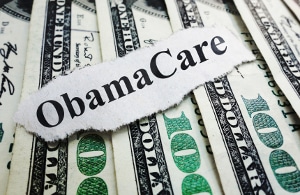
April 7, 2014
Springtime Observations On Obamacare
By Michael D. Shaw
It is a fool’s errand to attempt a cost-benefit analysis on government programs. War, for example, is probably the oldest government program. It is easy enough to determine the cost in lives and treasure, but it is far more difficult to determine the benefits, and then, if these benefits were worth the cost. Back in the day, victory was the goal, and presumably the overriding benefit. In the past, “victory” was always understood as causing your enemy to surrender. Nowadays, of course, that is no longer the case.
In the 1960s, it became popular to declare “war” on all sorts of social ills, starting with poverty. President Johnson sold his War on Poverty promising to give poor Americans “opportunity not doles,” and spoke of shrinking welfare dependence, rather than expanding it. Most importantly, his program would remove the root causes of poverty—presumably the lack of economic and educational opportunity.
Suffice to say, 50 years later, poverty is still with us, despite total federal expenditures upwards of $20 trillion, comprising dozens of programs. Check out the House Budget Committee’s report. Surely, it would have been better—and much more economical—to give every poor person a gift of $1 million, and call it a day.
As to the Affordable Care Act (Obamacare), we will have to reduce the time horizon to four years, as the ACA was signed into law on March 23, 2010. In fairness, there was plenty of doubt regarding its full implementation until the Supreme Court decision of June 28, 2012, so you can toss that into the mix, if you like. Nonetheless, the Feds were spending money like drunken sailors from the get-go, including tens of billions promoting electronic health records (EHR).
It was never made clear—and still is a mystery—how merely changing from paper to digital records would revolutionize medicine, as it proponents insisted. After all, regardless of technological improvements, health care is a one-on-one endeavor. Owing to the complexities of human pathology, and the inherent difficulties in communicating and interpreting symptoms to achieve a diagnosis, it may never be possible to replace a doctor or paraprofessional with a touchscreen-enabled patient questionnaire.
Notably, health care providers have spent a fortune to get EHR to work, and the results are far from encouraging. Indeed, tragic deaths have occurred, directly related to EHR.
What is clear is that digital information is much easier to store and transmit. By building treatment modalities into EHR systems, options can be limited and health care delivery—and thus costs—can be controlled. However, this raises the serious question of who is making these decisions, and how they are motivated. For example, is it good policy to cut Medicare and use some of the proceeds to pay for “free” birth control pills?
For those under 65 who think that ACA-inspired cuts in Medicare will not affect them, think again. Graduate Medical Education (GME), popularly known as medical residency programs, are paid for almost completely through Medicare. For the past several years, there have not been enough residency spots to accommodate those med school graduates who desired placement. To practice medicine, one must complete a residency program.
So, absent GME expansion, there is little reason—other than scoring political points from an ignorant electorate—to build more med schools. To put it another way, what good is expanding health insurance if there is a shortage of doctors? And make no mistake, there will be.
The ACA was sold to the public as a means to insure the uninsured, and to provide additional options for those already insured who may wish to shop around. Under no circumstances, though, would you lose your current insurance plan or doctor. But, that’s not exactly how it worked out. It remains to be seen if the ACA will ever reduce the number of uninsured, and to cast many of these into Medicaid is essentially a shell game.
Years from now, when all the markers are called in on the ACA, will we conclude—much as we did with the War on Poverty—that it would have been better and more economical to just subsidize or guarantee insurance for the uninsured?
